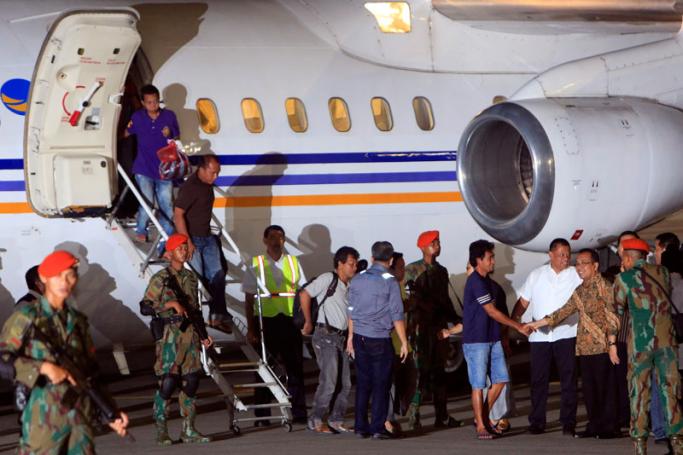Ten Indonesian sailors held hostage by Abu Sayyaf Islamic militants were freed in the southern Philippines on Sunday, officials said, less than a week after the gunmen beheaded a Canadian captive.
Unknown men delivered the 10 tugboat crewmen outside the home of provincial governor Abdusakur Tan Jnr on the remote island of Jolo during a heavy midday downpour, the official later told reporters.
On learning who they were, the politician's security men let them in and the governor said he fed them before turning them over to the police.
"The recovery of the 10 Indonesians is good news. We hope and pray that the others may also walk freely away from their captors," Tan said shortly before the Indonesians were flown to the nearby southern port of Zamboanga.
The authorities said the Abu Sayyaf were still holding at least 11 foreign hostages -- four sailors from Indonesia and four others from Malaysia, a Canadian tourist, a Norwegian resort owner, and a Dutch bird watcher.
The 10 Indonesians were let go six days after Abu Sayyaf members beheaded a Canadian tourist, John Ridsdel, for whom the gunmen had demanded $21 million in ransom.
Philippine President Benigno Aquino vowed Wednesday to neutralise the Islamic militants after the Canadian retiree's decapitated head was left outside a government building in Jolo.
The fate of the other hostages remained unknown even as artillery and military aircraft bombed suspected Abu Sayyaf positions on Jolo in the past week.
Officials would also not say if any ransom was paid for the release of the 10 Indonesians.
Their employers had received a ransom call from someone claiming to be from the Abu Sayyaf on the day they were abducted.
Abu Sayyaf does not normally free hostages unless a ransom is paid.
- Radical offshoot -"There have been a lot of efforts by the local and provincial government and the military and police in securing the safe release not only of the Indonesians, but other hostages as well," Tan said.
A consular official at Indonesia's Manila embassy, who gave his name as Tody, told AFP: "We cannot tell you any detail as of now. It's confidential."
In Jakarta, foreign ministry spokesman Arrmanatha Nasir told AFP: "Since this morning, the Indonesian foreign minister continued her coordination with her Filipino counterpart and our team on the field to confirm the information."
The 10 sailors were abducted off the southern Philippines on March 26 as their tugboat pulled a barge from Borneo island to the Philippines.
Filipino authorities later described the kidnappers as members of the Abu Sayyaf, a small group of militants based on Jolo and nearby Basilan island and accused of kidnappings and deadly bombings.
The group is a radical offshoot of a Muslim separatist insurgency in the south of the mainly Catholic Philippines that has claimed more than 100,000 lives since the 1970s.
Abu Sayyaf is believed to have just a few hundred militants but has withstood repeated US-backed military offensives against it, surviving by using the mountainous, jungle terrain of Jolo and nearby islands to its advantage.
Abu Sayyaf gangs have earned many millions of dollars from kidnapping foreigners and locals since the early 1990s.
Although Abu Sayyaf's leaders have pledged allegiance to the Islamic State group, analysts say they are more focused on lucrative kidnappings-for-ransom than setting up a caliphate.
Jakarta is to host a meeting of foreign ministers and military commanders from Indonesia, Malaysia and the Philippines on Thursday aimed at discussing joint naval patrols in the high seas where the sailors were abducted.
© AFP
You are viewing the old site.
Please update your bookmark to https://eng.mizzima.com.
Mizzima Weekly Magazine Issue...
14 December 2023
Spring Revolution Daily News f...
13 December 2023
New UK Burma sanctions welcome...
13 December 2023
Spring Revolution Daily News f...
12 December 2023
Spring Revolution Daily News f...
11 December 2023
Spring Revolution Daily News f...
08 December 2023
Spring Revolution Daily News f...
07 December 2023
Diaspora journalists increasin...
07 December 2023












